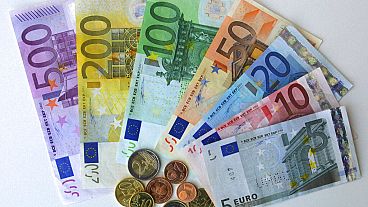So what now for the euro? As investors set their sights on the eurozone’s weakest members, are the days of the single currency numbered?
Euronews’ Tokunbo Salako spoke to Stephen Gallo, market analyst at Schneider Foreign Exchange.
Euronews: ‘‘This crisis seems to have been sparked by comments from Germany. What can prevent this contagion spreading to Portugal, Italy or even back to Greece?’‘
Stephen Gallo: ‘‘Yes, I would agree with you. A lot of stress within the Irish sovereign debt markets was triggered by comments from Germany. Germany seems to want to convince markets that it’s willing to go along the lines of a “haircut” for investors in a number of these peripheral sovereign debt markets. And since that has been put on to the table, markets have pretty much unanimously agreed that a lot of this debt is overpriced. So, you have contagion risks on the one hand and political risks on the other. Both are creating a firestorm for the euro in the short run.’‘
Euronews: ‘‘So what action, if any, can countries take in the face of this spreading contagion?’‘
Stephen Gallo: ‘‘It’s unlikely that policy makers are going to be able to prevent contagion altogether. This is going to be something the euro is going to continue battling against for at least the next three to six months.’‘
Euronews: ‘‘So, things are going to get worse before they get better?’‘
Stephen Gallo: ‘‘Absolutely. If this project is going to work, and I currently believe that it will, my longer term view is that the euro project will survive; it is almost surely going to be one of the most expensive projects in history to keep going, to keep alive. It’s going to cost money in terms of fiscal transfers from the core of Europe, it’s going to involve structural changes for a number of economies. At the moment, in the short run, there doesn’t seem to be any flexibility in terms of exit from the euro zone.’‘
Euronews: ‘‘But you do think the euro’s going to survive?’‘
Stephen Gallo: ‘‘Yes, in terms of my longer term views on the product, I do believe it will survive. I believe that a number of countries would be literally thrust back into the Dark Ages again, especially in the periphery of Europe if these countries were to leave the eurozone. For example, if you look at foreign investment flows into countries like Ireland prior to the launch of the euro, absolutely stagnant. When the euro was launched these investment flows picked up. There are airports, there is infrastructure in Ireland today which wouldn’t exist without the euro. So at the moment, I think the cost of exiting the euro is still higher than the cost of remaining inside the euro. The same goes true for the core of Europe. Germany is getting a lot of benefits from the weaker euro, in terms of its competitive edge on the export front. So at the moment, in the short run, there is no strong argument for exit. The market is poised here to have a rehash in many ways of what we saw with the Exchange Rate Mechanism (ERM) crisis in the early 1990s; it’s picking countries off one by one. Now that Greece and Ireland are taken care of in the short run, it is likely to take aim at Spain or Portugal, probably the latter before the former. So we’re in that kind of situation and turmoil is probably only going to get worse, in the near term, before it improves.



